12 Most Common WordPress Myths That Are Undermining Your Website’s Success
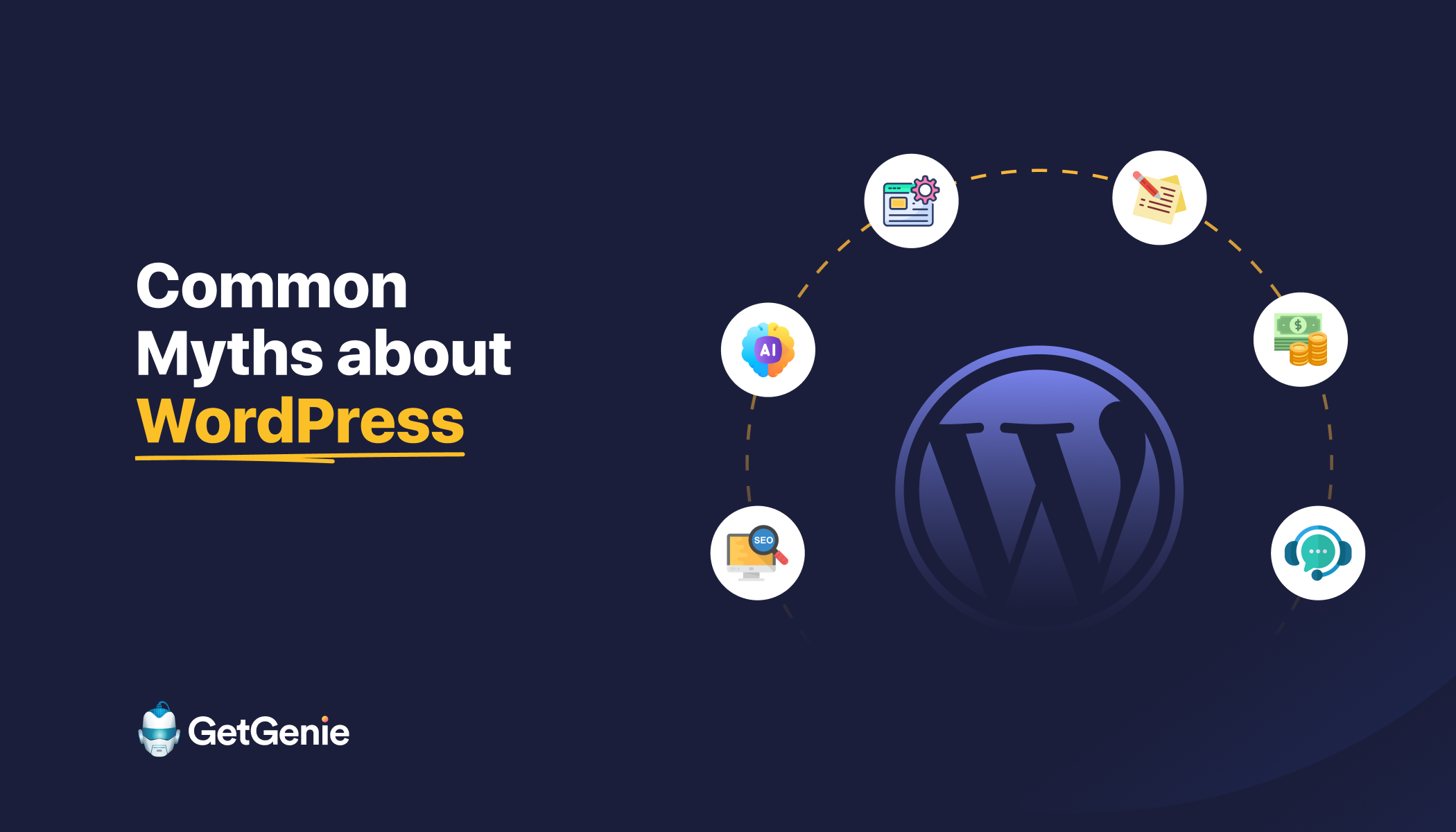
AI is becoming a dominant force in website development, yet WordPress remains the backbone of the internet, powering over 810 million websites worldwide. Its immense popularity has sparked a host of myths and misconceptions, despite its proven success and versatility.
Unfortunately, many of these WordPress myths stop businesses and individuals from making informed decisions about their web development strategy.
Whether you are a startup businessperson, an existing business owner, or a web developer, distinguishing fact from myth will allow you to harness WordPress’s full potential for your online success.
Why WordPress Myths Persist
The online development landscape is dynamic, and outdated information tends to persist for longer than necessary.
All WordPress myths stem from experiences with earlier versions of the platform or arise because people lack knowledge and don’t know precisely what WordPress is. First, get clear about WordPress, and then we’ll move on to its myths.
WordPress is:
- WordPress is an open-source content management system (CMS).
- It powers over 43% of websites globally.
- WordPress is highly customizable, thanks to its extensive theme and plugin library.
- It’s user-friendly, even for beginners without coding skills.
- WordPress supports blogs, e-commerce sites, portfolios, and business websites.
In addition, competing platforms and development companies will, at times, perpetuate these myths to direct clients to their preferred solution. This creates a pattern of misinformation that may have critical implications for business decisions and site performance.
Diving into 12 WordPress Myths People Often Have
Let’s explore some of the most common misconceptions about WordPress that may be holding you back from fully utilizing this powerful platform.
WordPress Myth 1: WordPress Is Only Suitable for Blogging
Many businesses fail to take the full potential of WordPress, thinking it’s good for blogging only. This is likely a result of WordPress having started as a blogging platform, but the truth has undergone substantial changes over the last 22 years.

Modern WordPress is a comprehensive content management system that powers everything from business websites to online stores.
Major brands like The New York Times, Sony Music, and The Walt Disney Company utilize WordPress for their primary web presence, indicating its use range extends beyond simple blogging functions.
WordPress Myth 2: AI Content Will Hurt
A common misconception is that AI-generated content will hurt your Google rankings. The key to ranking well is creating helpful, informative content that satisfies search intent and covers relevant topics.
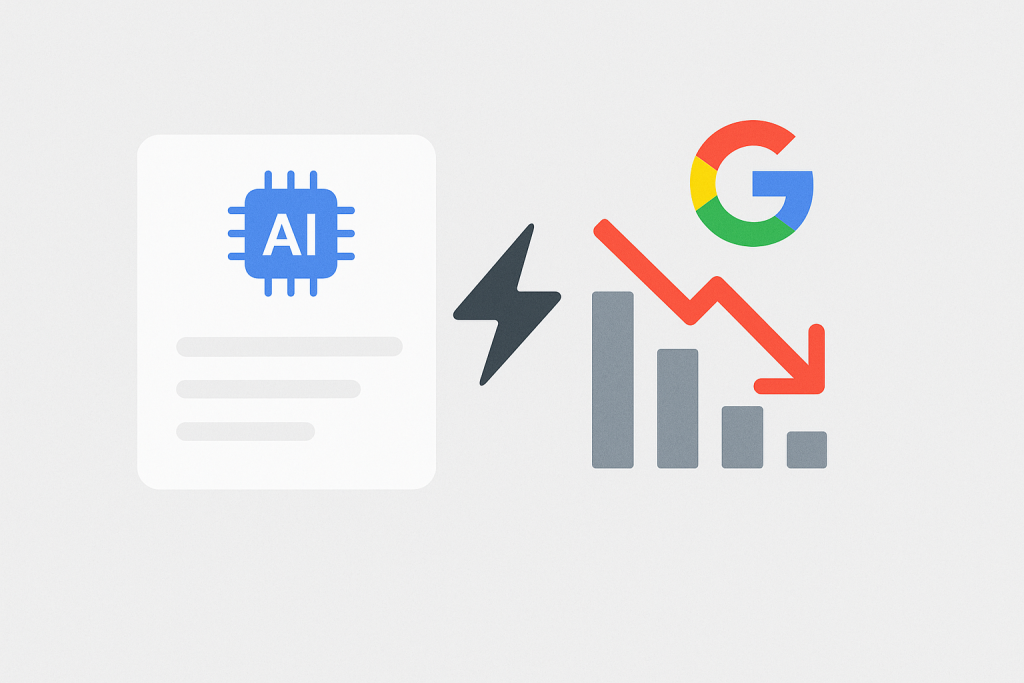
If AI-generated content is guided by human input, it can still perform well in the SERPs. In fact, AI SEO Writing tools exist to complement organic rankings, rather than create hurdles.
WordPress Myth 3: WordPress Sites Are Intrinsically Insecure
Security concerns are among the most dangerous WordPress myths circulating within the web design community. Specialists typically contend that since WordPress is open-source, it doesn’t automatically possess the security features that professional sites require.
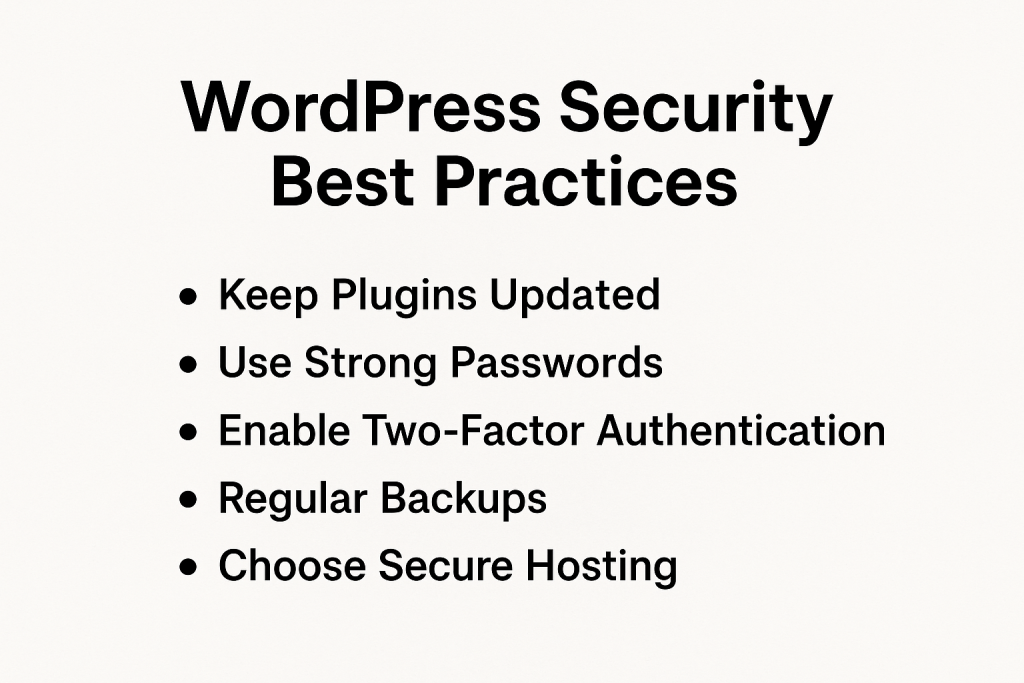
The WordPress core is regularly updated with security fixes by a dedicated team of developers. Most security problems have their root cause in outdated plugins, weak passwords, or poor hosting configurations, rather than in WordPress itself.
When maintained up to date with security best practices, WordPress websites are as secure as any proprietary content management system.
WordPress Myth 4: WordPress Cannot Handle High-Traffic Websites
Performance-based WordPress myths typically center on the site’s ability to accommodate high traffic and concurrent users. Such problems are usually caused by sub-optimally installed installations or inappropriately hosted setups.
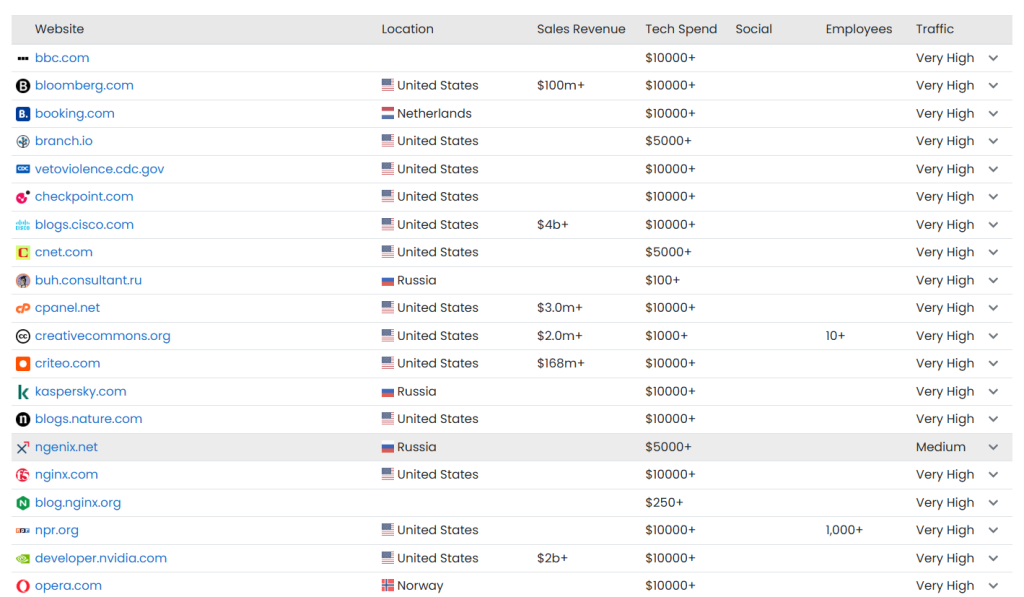
Enterprise WordPress implementations employ caching, content delivery networks, and optimized database queries to handle millions of visitors.
TechCrunch and BBC America are just a couple of examples of businesses that have successfully accommodated massive amounts of traffic using WordPress without sacrificing performance.
WordPress Myth 5: WordPress Has Limited Customization Options
WordPress myths often stem from fears about flexibility, in the sense that the platform limits one’s design and functionality choices. Such a myth often arises from comparisons with completely custom-made solutions that require massive development efforts.
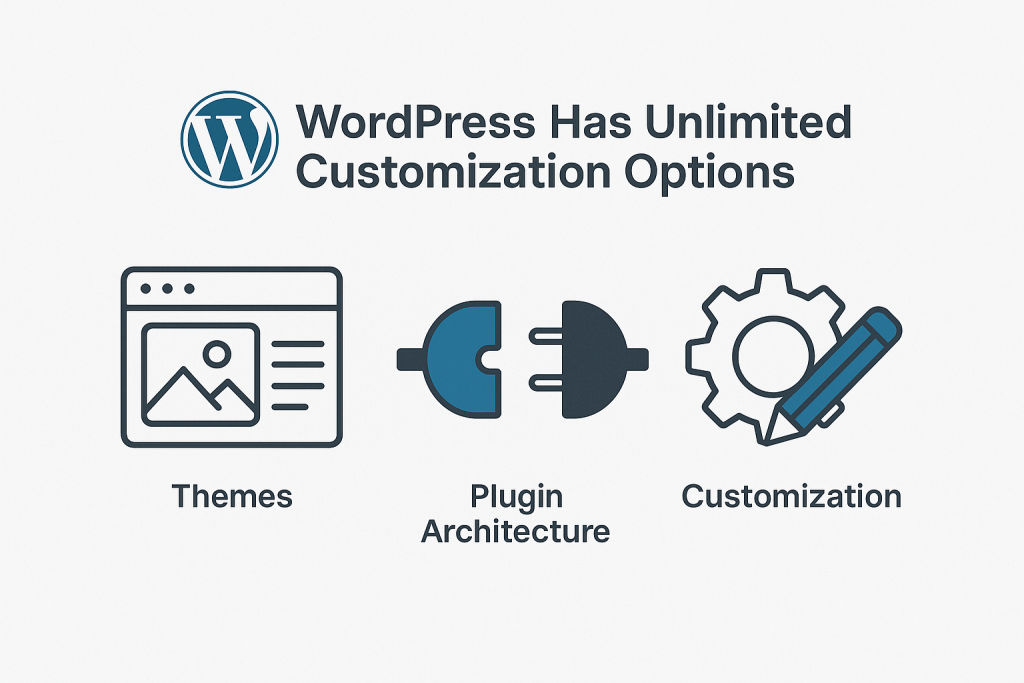
WordPress’s theme system, plugin architecture, and custom post types offer developers more customization possibilities than ever before.
WordPress supports high-functioning features like membership sites, e-commerce sites, and intricate database relationships, which are far beyond what is available in proprietary content management systems.
WordPress Myth 6: WordPress Needs a High Level of Technical Knowledge
Technological expertise is another field where numerous myths surround WordPress. Many potential users believe that maintaining a WordPress site requires highly advanced programming knowledge or constant technical maintenance.
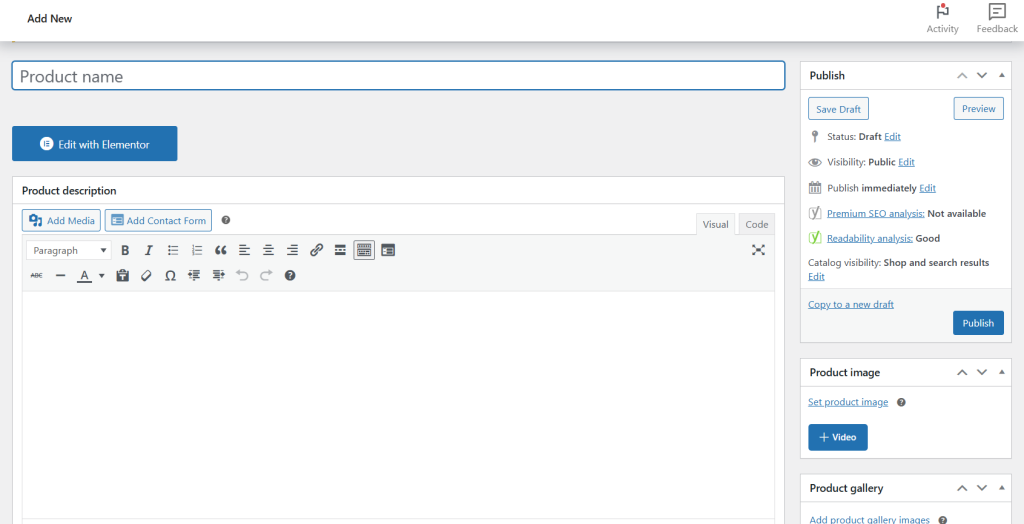
The intuitive nature of the platform enables non-technical users to easily update content, edit pages, and perform basic website operations without prior programming knowledge.
Advanced customizations may require specialized development skills, but basic site management is within the capabilities of users with limited technical knowledge.
WordPress Myth 7: WordPress Doesn’t Offer Professional Support Options
The WordPress customer support myth discourages businesses from using the platform. Open-source software cannot provide the professional levels of support that commercial enterprises require, critics claim.
In fact, WordPress offers numerous support options, ranging from comprehensive documentation and community forums to paid support services. There are thousands of trained WordPress developers and agencies offering professional services.
Additionally, the vast library of WordPress plugins further extends its functionality. These add-ons allow businesses to customize their sites and implement advanced features without needing extensive technical expertise.
WordPress Myth 8: WordPress is Expensive to Maintain in the Long Term
Cost concerns give rise to numerous WordPress myths, particularly regarding long-term maintenance and scaling expenses. These are typically cost analyses that exclude the total cost of ownership across different platforms.
Although WordPress core is gratis, businesses typically invest in premium plugins, themes, and hosting. However, such costs usually result in massive savings when it comes to licensing fees, transaction fees, and mandatory upgrades associated with proprietary content management systems.
WordPress Myth 9: WordPress Doesn’t Integrate Well with Third-Party Systems
Integration capabilities are another field where WordPress myths abound. Most people believe that the platform does not stand alone and is unable to integrate easily with existing business systems and third-party services.
WordPress’s webhook functionality and incredibly resilient API enable easy integration with CRM platforms, marketing automation tools, analytics software, and nearly any third-party service. The platform’s flexibility surpasses the integration capabilities offered by closed-source platforms.
WordPress Myth 10: WordPress Sites Are Difficult to Optimize for the SERPs
Search engine optimization concerns create additional WordPress myths. Skeptics have long maintained that the platform lacks the requisite SEO tools for a successful online presence and search engine ranking.
In fact, WordPress websites benefit from clean URL structures, fast loading capabilities, and mobile-compatible layouts favored by search engines.
Well-known SEO plugins, such as Yoast SEO, GetGenie, and RankMath, provide advanced optimization functionality that often surpasses the inherent capabilities of other content management systems.
WordPress Myth 11: WordPress Will Become Obsolete in the Near Future
Future-proofing problems is probably the most harmful WordPress myth. Others suggest newer alternatives will inevitably replace WordPress and invalidate current investments, as well as requiring expensive migrations.
WordPress remains dynamic, with ongoing updates, new features, and expanded capabilities, including the Gutenberg editor and the adoption of headless WordPress.
The software’s enormous user base, active community of developers, and Automattic investment ensure continued relevance in the evolving web development process.
Myth 12: WordPress Is Difficult to Switch to Another Platform
One of the most prevalent misconceptions is that migrating a WordPress site to a different platform is a complex and time-consuming process.
Although any website migration needs a good plan and action, WordPress itself is pretty simple to migrate, particularly in comparison with other content management systems.
With assistance from migration plugins, internal export/import tools, or professional services, it is manageable to move a WordPress website to a different host or platform.
The flexibility of the platform, coupled with numerous options for migration tools and resources, makes WordPress migration easy even for non-technical users.
In practice, it’s possible to migrate a WordPress site quickly and effortlessly if you adhere to best practices and ensure that your content and data are backed up correctly throughout the process.
WordPress Performance and Scalability Uncovered
Understanding true performance potential eliminates most WordPress myths. Properly optimized WordPress sites consistently have fantastic load times and can handle massive traffic loads.
Performance success is dependent on several factors, including the quality of hosting, the application of caching, image optimization, and effective database management.
These are requirements for any content management system, WordPress included, and are standard demands for professional web operations.
Why These WordPress Myths Persist in the Industry
Misinformation persists in the web development industry for several reasons. Competing platforms often highlight WordPress limitations while downplaying their own limitations and hurdles.
Additionally, poorly constructed WordPress websites sometimes perpetuate negative perceptions about the platform’s capabilities.
Sales teams that work with proprietary solutions can leverage these myths to their advantage by promoting higher prices or positioning their solutions as superior.
Understanding these motivations helps companies to evaluate information sources and make more informed decisions about web development strategy.
Making an Informed Decision About WordPress
Bypassing WordPress misconceptions means impartial examination of your specific business requirements and technology needs. Consider budget, technical ability, customization requirements, and long-term growth plans when evaluating content management systems.
Seek out successful WordPress implementations in your industry and speak with businesses that have achieved their goal on the platform. Other people’s practical feedback is more insightful than theoretical distinctions or marketing materials from different platforms.
WordPress Best Practices for Success
Avoiding the pitfalls that perpetuate WordPress myths takes adherence to specified best practices and industry standards. Invest in quality hosting, take proper security measures, optimize for performance, and engage veteran developers when advanced functionality is required.
Periodic checking, monitoring, and upgrading keep your WordPress site optimal in terms of functionality. Such practices apply to any content management system and are essential for maintaining a professional online presence and achieving business success.
The Future of WordPress Development
WordPress continues to expand with fresh additions of features, improved performance, and greater capabilities that address most of the age-old problems. Latest improvements include improved mobile optimization, advanced block editor functionality, and enhanced integration options.
The platform’s roadmap continues to focus on performance enhancements, security patches, and user experience improvements. Such advancements are set to keep WordPress at the forefront of the evolving web development as the world’s leading content management system.
Empacotando
The above 12 WordPress myths can significantly impact business decisions and web development strategies. By understanding the truth behind them, entrepreneurs can make informed choices and leverage WordPress’s growth and features for success.
Proper implementation, ongoing optimization, and realistic expectations are key to harnessing WordPress’s potential for long-term business growth.
With the right approach, WordPress can be a powerful tool for driving your online presence and achieving sustained digital success. And to complement your efforts, GetGenie can be your true ally!

